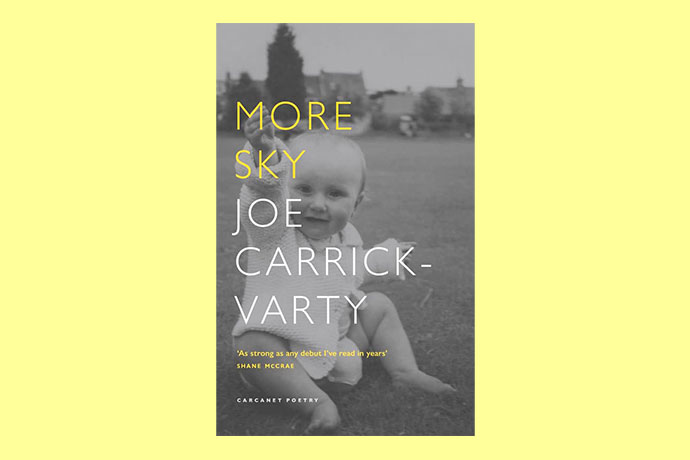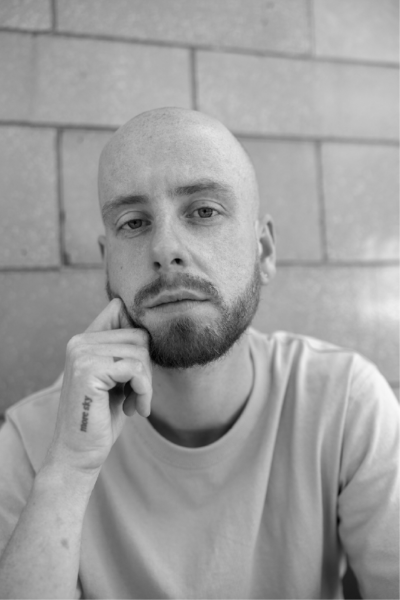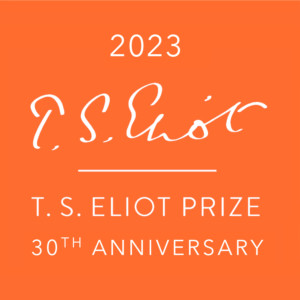Welcome to our T.S. Eliot Prize 2023 Writers’ Notes. This year, alongside the usual Readers’ Notes, the T.S. Eliot Prize and the Poetry School are collaborating on a set of Writers’ Notes for the shortlisted collections. These are educational resources for poets looking to develop their practice and learn from some of contemporary poetry’s most exciting and accomplished voices. Here’s Joe Carrick-Varty on his collection, More Sky.

I wrote More Sky throughout the early-middle part of my twenties. I think the oldest poem in the book (‘Somewhere Far’) was written at the end of 2016, when I had just finished my undergraduate degree, and the newest bit of the book (‘sky doc’) was written at the beginning of 2021, after that horrible second lockdown, as spring was approaching and light returning and I knew in my bones that I had survived. It feels important, at least to my understanding of the book, to be able to timestamp the poems in this way. The action of tying the writing to particular sections of my life, helps me to understand the person who wrote the poems. Because More Sky is a version of me; but it’s painful version I don’t quite relate to anymore. Like an old haircut or pair of jeans. So, I feel protective of this old me, if not a bit disgusted (lol) by him. How very gauche to have written such a book! How very gauche indeed.
Like, More Sky, at least in my mind, is quite an adolescent piece of work. And I don’t use adolescent as a qualifier for bad or unfinished here (although it might very well be both of those things!). I use adolescent to describe the book’s preoccupations: its obsession with childhood trauma, family ghosts etc. If I were to imagine all the books on the T.S. Eliot shortlist as people out in the world, living their lives, More Sky would be the youngest: a skinny teenager with a lip ring skuttling round the back of the bike sheds at breaktime to share a cigarette with an equally moody-looking friend. Think of all the baggage! All the awful family dynamics!
Trying on Voices
More Sky is comprised of two sections (two books, really). The first section probably reads like a pretty regular contemporary poetry book, in that it contains poems (yes, Joe, poems!) that have titles and are generally one-page long, or less. There are some prose poems. There are a few sequences. You get the picture. Now, much of this section was written during 1: the year preceding my Creative Writing masters, when I worked evenings in a pub and basically spent every day in the library, 2: during the year of my masters (shout out the Centre for New Writing at The University of Manchester), when I also spent every day in the library, and 3: during the year after my masters, when I worked as a postie, and finished early enough to spend most afternoons in the library. Yes! I spent the majority of my twenties in the library! What a crying shame…
There’s a breadth of form to this early section that is indicative of a person in education, trying on voices, like clothes, looking in the mirror to see what fits…
I think there’s a breadth of form to this early section that is indicative of a person in education, trying on voices, like clothes, looking in the mirror to see what fits, to see which poetic box best works for what it is you want to say. There’s also an awareness of precarity and, maybe, some anger too, which I think is indicative of what it feels like to be in your twenties today… with rent and energy prices rising, with many jobs (especially in the arts!) hard to come by and woefully underpaid. One of my friends said it best at the pub last week: kids, today, are getting older. Without much of a sure and solid future, growing up feels nigh on impossible. And again, I’m back at that word: adolescent.
An Order, of Sorts
When it became clear I had enough material for a book, I began compiling the poems into a single document, trying to configure an order of sorts. I hated this bit. Over the years I’ve heard poets stress the importance of the linear sequence of poems within a book. I’ve heard poets call this sequence a poem in itself. I don’t tend to read poetry books start to finish. I like to begin with a book’s final poem, and read backwards, then jump around. Surely this is one of poetry’s unique selling points (lord knows we could do with a few more USPs… operative word being ‘selling’). A book of poetry can be read in many ways; to ignore linearity is not to compromise the reading experience (it might even enhance the experience!), whereas with a novel, linearity is basically a necessity. To me, the process of ordering the poems, making them linear, felt like doing admin, far removed from the act of creating. Anyway, once I’d compiled the poems as best I could, I sent the document to the publisher, who thought, quite rightly, that the book was missing something. This was at the end of 2020.
It’s worth saying that at this point I had more or less fallen out of love with poetry. Having spent 6 months staring at the document of poems that was meant to be my book, I felt jaded. I wasn’t writing. I wasn’t reading poems for fun anymore. I was mainly binge-watching episodes of Lost in my little bedroom office at the top of the Lewisham house I shared with seven strangers from Spare Room. I remember on the 1st of January, walking in Hilly Fields, I decided to leave the book alone. To leave poetry alone. For the first time in years the proposition of never writing a poem again felt OK.
This Bodily Wrenching
I don’t think too much when I write. I never write with an acute reader in mind. I never write with an outcome or strategy in mind. I just follow the urge to get something out, to literally wrench something out of my body. And this bodily wrenching is exactly what happened with ‘sky doc’, a 63-page poem that uses the refrain ‘Once upon a time when suicide was’.
Unable to read poems, I read young adult novels. I read the books I read as a moody young person… and I found space again, and with it came my voice.
I began writing ‘sky doc’ on the 1st of April 2021, exactly three months after giving up on my book, and nearly a year since I’d last written a poem, and by the end of April, it was finished. I remember reading an interview with Will Harris, where he mentioned a time of bad writer’s block during the process of writing his debut collection RENDANG (Granta, 2020). Will said he’d found comfort in reading far outside of poetry. I think he’d settled on scientific journals about biology (I might be misremembering here) in order to negate the strange claustrophobia of poetry. During those first months of 2021, unable to read poems, I read young adult novels. I read the books I read as a moody young person: Jaqueline Wilson, Darren Shan, Malorie Blackman, John Green. For three months I didn’t read a single poem, but I read more than 30 books, and I found space again, and with it came my voice.
The Dream in the Dark, the Voice, Returning?
Being on the shortlist for the Eliot is very strange. The act of publishing More Sky initially felt like a party everyone comes to then abruptly leaves. Like, one minute you’re inviting people to the Zoom launch of your trauma, and the next you’re back where you started: in the musty living room with the curtains shut and the morning beyond all bright and scary… which is, I guess, where the work begins again.
The shortlist has brought a lot of attention to my book, which is truly a blessing. It’s something you dream of as a poet, especially for a debut, but it’s something you can’t really prepare for. More Sky carries a lot of shame, a lot of pain: a lot of dark family secrets are buried there, and I’m still learning, still coming to terms with exactly what I’ve done publishing such a book.
So, as I write this, it’s morning and the rooftops beyond my window are white with the first frost. My breath is making clouds in the room. My cat, Monday, is calling from her cushion. I feel winter beckoning its long finger. Somewhere behind these short days waits the new year. When all of this is over, I hope to find space again, and, if I’m lucky, my voice too.
Joe Carrick-Varty‘s More Sky (Carcanet Press, 2023) is shortlisted for the T.S. Eliot Prize 2023. Order your copy here.

Joe Carrick-Varty is a British-Irish poet, writer and founding editor of bath magg. In 2018 he won the New Poets Prize and in 2022 he won an Eric Gregory Award. Joe is currently the 2023 Anthony Burgess Fellow in Creative Writing at the University of Manchester.

Add your Reply
You must be logged in to post a comment.